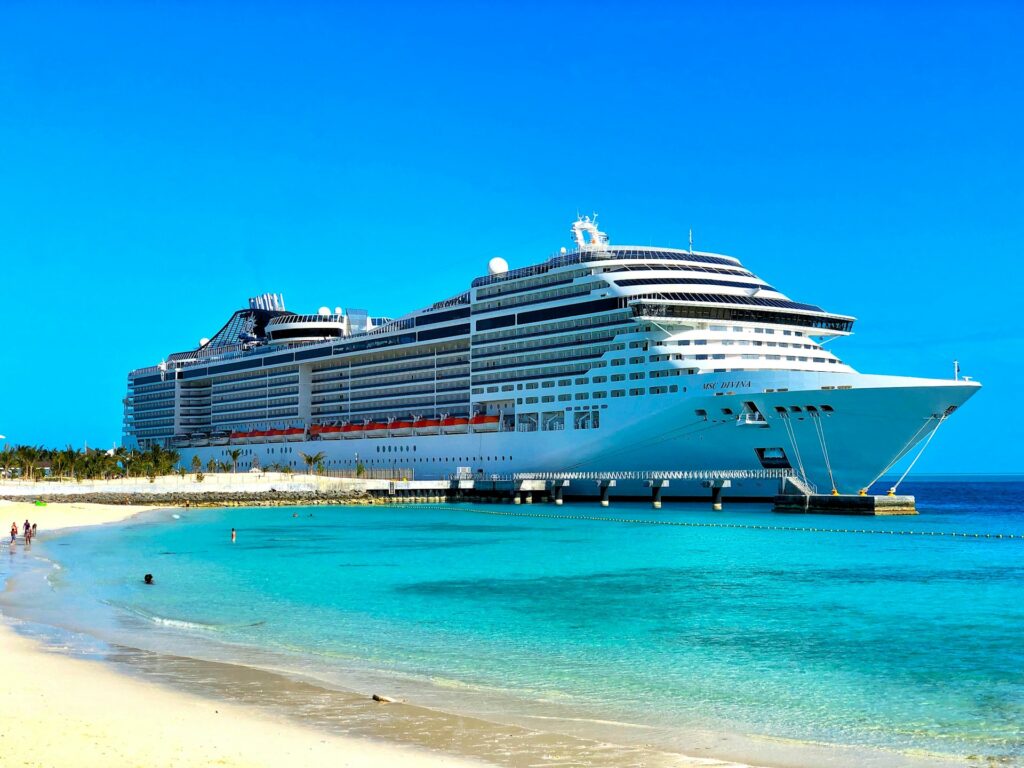
A cruise is a vacation spent traveling on a ship for pleasure.
Cruise ships transport passengers to different destinations, often with stops at multiple ports along the way. Passengers enjoy amenities like restaurants, nightclubs, casinos, swimming pools, and entertainment.
Key aspects
- Ship: Cruises take place on large passenger ships which are essentially floating resorts. They have multiple accommodations, dining venues, pools, theaters, and recreational facilities.
- Itinerary: A cruise follows a set itinerary, stopping at different ports along the way where passengers can go ashore and explore.
- Duration: Cruises can last from a couple of days to weeks or even months for world cruises. Common lengths are 3-7 night cruises or longer 10-14 night cruises.
- All-Inclusive: Most cruises are sold as all-inclusive vacations, with the fare covering accommodations, meals, entertainment, and most onboard amenities.
- Destinations: Cruises visit destinations around the world, with popular cruise regions including the Caribbean, Mediterranean, Alaska, Mexico, Hawaii, and Europe.
- Activities: Beyond visiting ports, cruises offer a host of activities on the ship. These include dining, live shows, casinos, spas, pools, sports courts and more to keep passengers entertained during days at sea.
How much does a cruise cost?
Let’s assume that the daily cost of a cruise is $ 260 per day. This comprises a ticket price of $179.01 and on-board spending of $80.05 per person.
Here’s a rough estimate of costs based on number of days:
| Number of Days | Approximate Cost (Per Person) |
|---|---|
| 3-4 Days | $780 – $1,040 |
| 5-7 Days | $1,300 – $1,820 |
| 8-10 Days | $2,080 – $2,600 |
| 11-14 Days | $2,860 – $3,640 |
These are rough estimates. The actual cost of a cruise can vary significantly depending on factors such as the cruise line, ship, stateroom category, destination, time of year, and any additional expenses like shore excursions, specialty dining, or onboard activities.
What to pack for a cruise?
When packing for a cruise, consider the diverse range of activities and settings you’ll encounter.
Start with comfortable, versatile clothing suitable for both casual days on the ship and exploring ports of call. Pack a few dressier outfits for formal nights and upscale dining experiences.
Don’t forget essentials like swimwear, sunscreen, and any necessary medications. Organize your belongings neatly, keeping in mind the limited space in cruise staterooms.
Research the specific cruise line’s policies and amenities to ensure you have everything you need for a seamless, enjoyable voyage.
How fast do cruise ships go?
Cruise ships typically travel at speeds ranging from around 15 to 25 knots (about 17 to 29 mph or 28 to 46 km/h).
- Larger ships tend to go a bit slower, around 18-22 knots, while smaller ships can reach 24-25 knots.
- During transatlantic or transpacific repositioning with few port stops, ships travel at their maximum speed of 25 knots or slightly higher.
- In ports and narrow waterways, ships must significantly reduce speed, often down to 5-10 knots.
- Factors like ship size, hull design, engine power, and weather conditions impact the achievable speed.
FAQs
Yes you can. But only in designated smoking areas. Indoor public spaces are off limits unless it’s a smoking lounge. You can smoke in private balconies but there are restrictions. Best to read the rules beforehand.
No. Cannabis/ Marijuana or any other illegal drugs are prohibited. Maritime laws classify cannabis as an illegal controlled substance. Carrying it can lead to confiscation/ legal consequences.
Yes. Most large ships will have atleast 1 or 2 ATM machines. However, if you have a credit/debit card, you wont need a machine. Also remember that ATM machines on board have a much higher usage and transaction fee.
Yes. But this depends on the provider.
– Typical allowance is 1-2 bottles of wine or champagne per stateroom (750ml or less).
– Cruise lines usually permit beer within a 12-pack limit per stateroom.
– Cruise lines generally prohibit bringing hard liquors/spirits on board.
– Any alcohol you bring must be in your carry-on, not checked luggage.
– The cruise line will confiscate and return excess alcohol at the trips end.
Many also charge a corkage fee (around $10-25 per bottle) if you want to consume your personal wine/champagne in the main dining rooms rather than just your stateroom.
Yes. But availability is limited. Most companies close bookings 48 hours before departure. Last minute prices are high plus you won’t get a discount. Popular cruise activities could also be vlocked out by then. It’s ok to do it, just not fun.
Yes. Especially if the ship is visiting foreign ports. The rule of thumb is to bring a passport even if you don’t need it. Ensure your passport is valid for at least 6 months after your travel dates and has more than 3 empty pages.